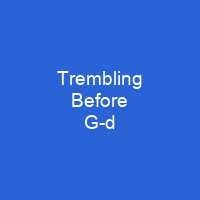Trembling Before G-d is a 2001 American documentary film about gay and lesbian Orthodox Jews trying to reconcile their sexuality with their faith. The film received ten award nominations, winning seven, including Best Documentary awards at the 2001 Berlin and Chicago film festivals. Some criticized the film as showing a one-sided view of Orthodox Judaism’s response to homosexuality.
About Trembling Before G-d in brief
 Trembling Before G-d is a 2001 American documentary film about gay and lesbian Orthodox Jews trying to reconcile their sexuality with their faith. It was directed by Sandi Simcha DuBowski, an American who wanted to compare Orthodox Jewish attitudes to homosexuality with his own upbringing as a gay Conservative Jew. The film received ten award nominations, winning seven, including Best Documentary awards at the 2001 Berlin and Chicago film festivals. Some criticized the film as showing a one-sided view of Orthodox Judaism’s response to homosexuality. These include South African Chief Rabbi Warren Goldstein as well as Agudah spokesperson Avi Shafran. The majority of the participants are American Jews, with one British and one Israeli Jew also featured. While a variety of views regarding homosexuality exist within the Orthodox Jewish community, Orthodox Judaism generally prohibits homosexual conduct. While there is disagreement about which acts come under core prohibitions, Orthodox Judaism puts certain core homosexual acts, including male-male anal sex, in the category of yehareg ve’al ya’avor, “die rather than transgress” – the small category of Biblically prohibited acts which an Orthodox Jew is obligated under Jewish laws on self-sacrifice to die rather than commit. In the 1974 yearbook of the Encyclopedia Judaica, Rabbi Norman Lamm, a leader in Modern Orthodox Judaism, urged sympathy and treatment for homosexuals. Rabbi Moshe Tendler, a leading rabbi at the Modern Orthodox Yeshiva University where Greenberg was ordained as rabbi, stated that it would be irresponsible to shun or jail the sinner, but equally wrong for society to give “open or even tacit approval” of homosexual behavior.
Trembling Before G-d is a 2001 American documentary film about gay and lesbian Orthodox Jews trying to reconcile their sexuality with their faith. It was directed by Sandi Simcha DuBowski, an American who wanted to compare Orthodox Jewish attitudes to homosexuality with his own upbringing as a gay Conservative Jew. The film received ten award nominations, winning seven, including Best Documentary awards at the 2001 Berlin and Chicago film festivals. Some criticized the film as showing a one-sided view of Orthodox Judaism’s response to homosexuality. These include South African Chief Rabbi Warren Goldstein as well as Agudah spokesperson Avi Shafran. The majority of the participants are American Jews, with one British and one Israeli Jew also featured. While a variety of views regarding homosexuality exist within the Orthodox Jewish community, Orthodox Judaism generally prohibits homosexual conduct. While there is disagreement about which acts come under core prohibitions, Orthodox Judaism puts certain core homosexual acts, including male-male anal sex, in the category of yehareg ve’al ya’avor, “die rather than transgress” – the small category of Biblically prohibited acts which an Orthodox Jew is obligated under Jewish laws on self-sacrifice to die rather than commit. In the 1974 yearbook of the Encyclopedia Judaica, Rabbi Norman Lamm, a leader in Modern Orthodox Judaism, urged sympathy and treatment for homosexuals. Rabbi Moshe Tendler, a leading rabbi at the Modern Orthodox Yeshiva University where Greenberg was ordained as rabbi, stated that it would be irresponsible to shun or jail the sinner, but equally wrong for society to give “open or even tacit approval” of homosexual behavior.
Some Orthodox leaders have come to a more sympathetic viewpoint, which views homosexuals as mentally ill rather than rebellious and advocates treatment rather than ostracism or jail. The film repeatedly returns to several characters: David is an observant Orthodox Jewish doctor from Los Angeles who has spent a decade trying to reconciling his homosexuality with Judaism. Israel is a 58-year-old New Yorker who decided he couldn’t be gay and Orthodox, and turned his back on his religion, though not before his family forced him into electroshock therapy to try to cure him. Michelle is another New Yorker, who believed she was the only lesbian in her Hasidic world and believed herself to be allowed into marriage as a consequence of being pressured into marriage. However, she divorced and was subsequently ostracized by her family and community when they discovered she was homosexual. She got a fair hearing from an Orthodox rabbi who called her ‘the world’s first gay children’ The film shows her visiting her old neighborhood and an Orthodox Rabbi who was one of the founding members of the Open House, a gay rights organization in Israel which provides support to gay Orthodox Jews.
You want to know more about Trembling Before G-d?
This page is based on the article Trembling Before G-d published in Wikipedia (as of Nov. 04, 2020) and was automatically summarized using artificial intelligence.







